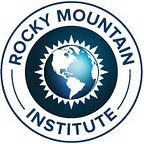Creating a Low-Carbon Future
Making efficient energy systems that emit little or no CO2
When you’re in a hole, stop digging. Our climate got shifted onto a path to catastrophic warming because the ways we produce, use, and waste energy emit a massive amount of carbon into the atmosphere every single day. With the help of our partners and supporters, we are reducing those carbon emissions by transforming global energy systems. And we’re proving that the climate challenge is not only solvable, but also a huge economic opportunity that can benefit future generations — and our own.
We’re working with utilities, regulators, technology providers, and other system stakeholders to shift energy supply away from fossil fuels and toward clean, renewable energy. And we’re having an impact on the demand side of the equation by helping people, countries, and corporations to both consume renewable energy where they can and to use energy more efficiently everywhere. On the following pages are some of the impacts that partners and supporters like you helped us make in the last year.
Helped the Hawaii Public Utilities Commission to support the state’s transition to a 100 percent renewable electricity system by 2045.
We continue to provide important analytic support and strategic input to the commission as it manages numerous open regulatory proceedings to modernize Hawaii’s electricity system and utility business model. Like all our work with islands, success here will prove that an entire economy can convert to clean energy.
Busted the split-incentives barrier in high-performance and net-zero buildings
with the release of green lease guidelines and a demonstration project in our own new Boulder office — the first net-zero lease in the nation for a development of its size. Now tenants and owners can dependably share in the cost savings that come from energy savings.
Enabled corporations to buy renewable energy and realize more than 2 gigawatts of new renewables on the U.S. grid.
RMI’s Business Renewables Center now has more than 200 member companies that are collectively responsible for 94 percent of all nonutility renewable deals. We support the industry in many ways, including our new Buyers Roadmap online learning platform for renewable energy buyers, demonstrating how they can change the energy landscape by choosing renewables.
Brought clean solar power and cutting-edge battery storage to a South African gold mine.
In partnership with the major global mining firm Gold Fields, we helped identify and design a plan to install 40 MW of solar with up to 7.5 MWh of storage. Building on this success, we are working toward a goal of facilitating 15 percent industry-wide penetration of renewables by 2025.
Brought the abatement of methane leakage and flaring to the forefront of the petroleum ministries in Oman, Nigeria, Iran, and Kazakhstan.
We also helped ensure that methane abatement is included in the manifesto of the Future Energy Forum of the Kazakh Expo that charts national goals for the energy transition. Methane is a greenhouse gas 85 times more potent than CO2.
Advanced the transparency of home energy performance and the availability of home energy financing products.
We advised the nation’s biggest mortgage institutions and forged connections and established best practices among data providers and online real estate portals to reach millions of U.S. homeowners.
Supported publication of the City Peaking Handbook with China’s Alliance of Peaking Pioneer Cities (APPC).
Generous grants to RMI from Bloomberg Philanthropies, Energy Foundation China, and the Swedish Postcode Foundation funded the team’s technical support to leaders of the APPC initiative, a consortium that includes nearly 100 leading Chinese cities representing over half of the country’s GDP and CO2 emissions. The handbook lays out key steps and best practice for cities to cost-effectively peak their energy-related CO2 emissions ahead of the 2030 national target by decreasing emissions in the urban buildings, industry, transportation, and electricity sectors.
Created a scalable approach to commercial building retrofits
by working with portfolio owners and investors — who have struggled to see investment-grade opportunities within traditional retrofit models. Two pilots undertaken with collaborators in the market have proven, this approach works — and is effective for both owner-occupied and investor-owned portfolios.
Brought RMI’s Business Renewables Center (BRC) to China.
More than 50 corporate buyers, renewable energy developers, and other stakeholders participated in the inaugural workshop for BRC: China. Under RMI’s leadership, members of this workshop are now actively collaborating on some of the first direct-purchase renewable transactions in China.
Demonstrated a clear opportunity for many utilities and energy end-users to save money through community-scale solar.
A procurement process in Colorado on behalf of a group of rural electric co-ops resulted in proposals from developers at record-low prices. We’re helping others pursue this opportunity in Colorado, New Mexico, New York, Texas, and the Southeast.
Conceptualized an analog to property assessed clean energy (PACE) for China.
PACE real-estate financing ties energy-efficiency upgrades to property-tax assessments, matching savings and financing cash flows. RMI worked with China’s Ministry of Finance to design a PACE-like mechanism that achieves a similar end, but in a way consistent with China’s very different tax
codes, and is now exploring its first application.
Supported a landmark partnership in North Carolina
between Duke Energy, the City of Asheville, and Buncombe County to create innovative clean energy solutions that will meet the area’s growing energy needs and prevent the construction of a planned natural-gas-fired power plant in Asheville. RMI aims to scale this collaborative model for other communities and utilities to work together to build a smarter and cleaner energy future.
